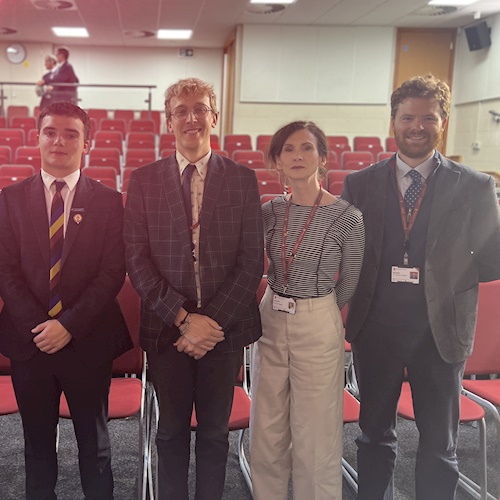
Following the success of previous Shiplake Question Time-style discussions, our Year 12 pupils once again gathered to hear a panel of teachers (and one pupil) tackle some of the big questions that have been stirring conversation around the College. From school rules and national politics to whether humanity would thrive or crumble without emotion, no topic was off limits.
On the panel today was a superstar panel – Ms Magee, Mr Pettifer, Mr Burrows, and one of our Joint Deputy Heads of College, Angus Mullens. The format was simple: each panellist had a minute to respond to the questions and our Year 12 pupils were not disappointed.
Teachers can now see our screens whenever they choose. There are strict rules being enforced with renewed determination on our hair, our clothes, whether we can wear one bracelet or two. The question is, why don’t you trust us?
Ms Magee opened the discussion, drawing comparisons between school life and the professional world our pupils are preparing for. Rules, she explained, are a form of training just as adults must abide by laws and workplace expectations.
Mr Burrows explored the theme of trust, suggesting that it’s not about ‘spying’ but about guidance. Teachers, he said, are there to help pupils develop self-control and learn to use devices productively. Mr Pettifer expanded on this pointing out that life after Shiplake comes with far greater expectations. Turning the question around, he asked pupils directly if they trust themselves to stay on task, reminding everyone that this is an issue of human nature, not just sixth form policy.
The sole pupil voice on the panel, Angus offered a counterpoint, arguing that teachers also need to trust pupils more. While accepting that some monitoring may be necessary, he felt there should be clear boundaries around when and why it happens.
Does politics have any role in sport?
Mr Pettifer was quick to point out that politics and sport have long been intertwined, referencing the 1995 Rugby World Cup and Nelson Mandela’s powerful use of the event to unite South Africa. Mr Burrows raised the example of the 2022 Qatar World Cup, where human rights issues were thrust into the spotlight. He noted that sporting events carry moral weight, and that athletes and organisers alike have a responsibility to ensure that the platforms they use meet basic ethical standards. Ms Magee reflected on how deeply sport is connected to national identity, arguing that it’s almost impossible to untangle the two. As with conflict or war, sport and politics often share the same emotional roots: pride, loyalty, and belonging. Angus took a more traditional view, suggesting that athletes should focus on the game itself adding that they play for the love for the sport and entanglements risk alienating both audiences and players.
Would we be better, or more efficient, if we had no emotions?
This philosophical closer sparked some thoughtful reflection (and a few laughs). Miss Magee was firm in her answer: absolutely not. Passion is what drives people to achieve greatness with love and motivation emotional at their core. Mr Burrows agreed, suggesting that without emotion, humanity would lose perspective and that logic alone can’t define what’s meaningful. Mr Pettifer considered the question from both sides, admitting that while we might become more efficient, it would come at the cost of all being the same. Angus concluded the debate on a lighter note, summarising the sentiment in one line: ‘Without emotion, everything would just be boring.’
Thank you to our superstar panel, and we look forward to the next edition of Shiplake College Question Time!









